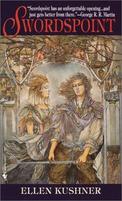
| Series: | Riverside #1 |
| Publisher: | Bantam |
| Copyright: | July 1989 |
| Printing: | February 2003 |
| ISBN: | 0-553-58549-3 |
| Format: | Mass market |
| Pages: | 329 |
In an unnamed city in a medieval world, Richard St Vier is the pre-eminent swordsman. He fights on behalf of nobles, takes contracts for assassination by duel, is paid well. But he is only partly part of their world; he moves into their world to do his work, and then returns to Riverside, where the Watch don't go and where life doesn't involve carriages and servants. It does involve frequent fights, particularly since Alec is his companion and lover. Alec is a former university student with a taste for danger and self-destruction, unpredictable, mercurial, and fond of baiting people until Richard has to kill them.
Up on the Hill, Lord Michael Godwin is primarily concerned with his next tryst, playing the game of seducer and seduced with the noble women (and sometimes the men). He stumbles on the idea of swordplay purely by accident, and onto the political treacheries and alliances of the city nearly as accidentally. In the process, he discovers some things about himself that quite surprise him.
Swordspoint is a hard book to describe. It is, in a sense, a romantic adventure of love, intrigue, and daring swordplay, and it delivers the excitement and deviousness of a good example of that story. Its tone, however, is memorably at an angle to how that story is normally written. The characters are superb and far from archetypes. There's no stock coming-of-age story; even the coming-of-age aspects of Michael's story lead far away from the expected conclusion. It's surprisingly without noble ideals, high-minded principles, or black-and-white morality. And because of that, it's utterly compelling, full of characters one can believe in rather than map to stock story roles.
Richard, in particular, behaves like a swordsman in a way that highlights how many fantasy heroes don't. Kushner portrays his calm professionalism, confidence, charisma, and dedication with a tight third-person perspective and a light, matter-of-fact touch. He is completely believable as a professional because he demonstrates the aura of solidity and self-confidence that most characters only develop slowly or are decreed to have. Despite being one of the main actors of the story, Richard is in a sense the background against which the other characters are displayed. He knows who he is, knows what he is good at, and follows his personal competence and life decisions with a calm conviction that anchors the story and provides the reader with a gradually-revealed, always-consistent base. The novel form is usually about change, but while other characters grow and are altered by this story, Richard is simply Richard.
Stylistically, the acumen with which Kushner pulls this off is impressive. She doesn't start with a blank slate or even a mysterious past. Richard is fully formed at the start of the story and does not alter who he is over the course of it, and yet Kushner lets the reader slowly get to know him and admire him over the course of the story by revealing consistent facets and playing other characters off against him. It's easier to create a reader bond with a character by letting the reader live through formative events with the character. Kushner takes the harder road, helping the reader delight from early in the novel at how utterly like Richard his most recent action was, and still manages to create that sense of attachment.
There is a plot, a good one, involving intrigue, treachery, danger, and secret pasts. The climax is one of those satisfying, wonderful triumphs where everything works out just the way that you'd hoped even though you couldn't see how it could work. But the beauty of this story is in the characters, in a wonderful interplay of class, confidence, and character. This is not a world in which people get things by hoping for them, in which dreams always come true, or in which people's internal damage goes away magically after confrontation. But it's a world in which people learn how to be try to themselves, or simply are what they are no matter what the world brings. It was delightful and highly recommended.
Included in this edition as an appendix of sorts are three short stories with the same characters set in the same universe:
"The Swordsman Whose Name Was Not Death": Richard picks up an admirer who wants him to teach swordplay. Richard doesn't normally teach, but this time he manages to get angry enough for a lesson or two. This was a story that I got more out of on a second reading. There's a lot of subtext about society and roles, about understanding or not understanding other people's problems and pain. Worth thinking about. (8)
"Red-Cloak": This is the first story about Richard and Alec, and I thought it was a little slight. There's good banter and a nice bit of characterization if you'd not seen them before, but after a book of far deeper characterization, it was well-trod ground. Richard is, of course, wonderfully matter-of-fact, but that's about the only appeal. (6)
"The Death of the Duke": This is a great coda to the book. It's fairly clear halfway through what's going on, but I'll leave you to work it out yourself. Suffice it to say that it puts some sharp depth of emotion into a major relationship of the novel in a very satisfying way, and is wholly true to the characters. It's a lovely bit of melancholy and acceptance. (9)
Followed by The Fall of the Kings.
Reviewed: 2007-11-29